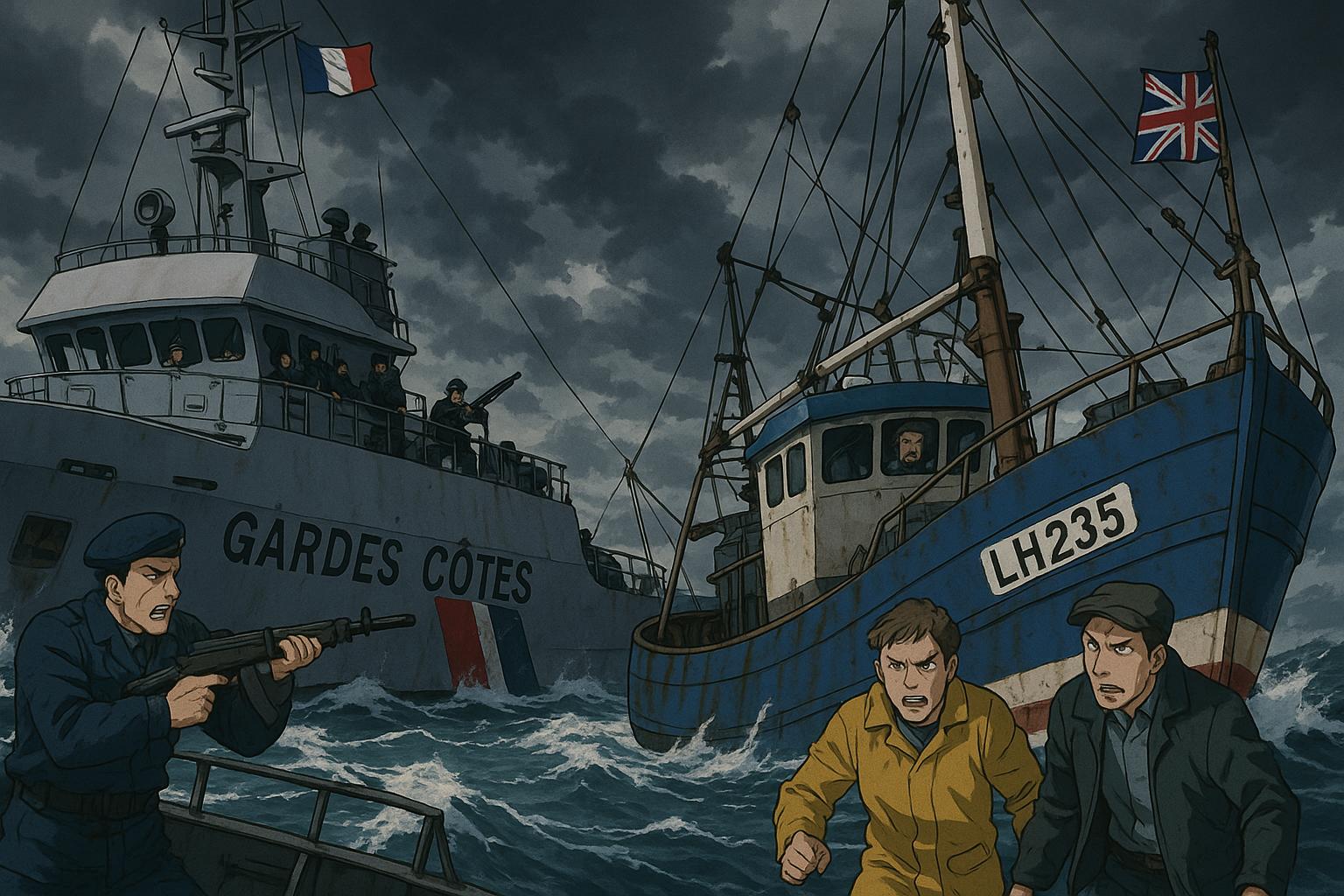The recent impoundment of a British fishing vessel by the French coast guard in Boulogne has intensified tensions over post-Brexit fishing rights, coming days after the UK agreed to extend EU fishing access to its waters amid criticism from British fishermen and politicians.
The recent seizure of a British fishing vessel by the French coast guard has reignited tensions surrounding post-Brexit fishing rights between the UK and France. The vessel was intercepted by the French Navy in the English Channel and subsequently impounded at the port of Boulogne after being found allegedly operating without a licence. This incident is significant not only for its implications for fishing rights but also for the broader context in which it unfolds, particularly the recent deal struck between the UK and the EU.
The timing of this incident is notable, coming just days after UK Prime Minister Sir Keir Starmer faced criticism from British fishermen regarding a new agreement that extends access for EU fishing vessels to UK waters for an additional twelve years. Critics, particularly from the Conservative Party, have described the deal as a “surrender” to EU demands, arguing that it undermines the interests of British fishermen who expected greater protections and autonomy post-Brexit. Shadow home secretary Chris Philp expressed particular frustration, pointing out France’s perceived inaction against illegal immigration across the Channel while swiftly enforcing fishing regulations against UK vessels. His comments highlight the dual nature of the UK-France relationship, at once interdependent and adversarial.
The French coast guard’s actions reflect ongoing excavation in the post-Brexit landscape, a climate charged with disputes over fishing rights that have persisted since the UK’s departure from the EU. Already strained, the relationship was further aggravated by earlier actions, such as the detention of a British trawler in late October 2021, where similar allegations of illegal fishing were made. That incident saw the French authorities escalate their response to include fines on other British vessels and the temporary closure of French ports to UK trawlers. This series of actions indicates a significant willingness on the part of French authorities to assert their maritime rights, as articulated in statements from French officials advocating for a more robust approach to negotiations.
In this context, the impoundment of the British vessel at Boulogne serves as both a practical enforcement action and a symbolic gesture amidst the tumult of ongoing negotiations regarding fishing rights and broader trade relations post-Brexit. The UK government’s attempts at negotiation have been met with criticism from multiple fronts, struggling to balance the expectations of domestic fishermen with obligations under international agreements. The Foreign Office confirmed involvement in the case, offering assistance to the affected British national while refraining from further comments due to the ongoing investigation.
As discussions unfold, the imperative for defining clear maritime boundaries and fishing rights remains paramount. The evolving narrative surrounding these incidents reinforces the complexity of UK-EU relations in a post-Brexit era, where fishing rights have emerged as a battleground for larger issues of sovereignty and fairness in international law. Thus, the recent seizure is more than a regulatory measure; it is emblematic of deeper political currents and the ongoing struggle to reconcile local industry interests with international obligations.
In summary, the legal repercussions faced by the British vessel, combined with the backdrop of a contentious trade deal, illustrate the fragility of UK-EU relations in specific sectors like fishing, revealing a landscape where enforcement and negotiation remain at odds.
Reference Map:
Source: Noah Wire Services
- https://www.bbc.com/news/articles/cn05268j86zo – Please view link – unable to able to access data
- https://www.bbc.com/news/articles/cn05268j86zo – The BBC article reports that the French coast guard impounded a British fishing vessel accused of illegal fishing in French waters. The vessel was seized in the English Channel and is being held at the port of Boulogne while French authorities consider prosecution. The incident occurred shortly after UK Prime Minister Sir Keir Starmer faced criticism from British fishermen over a deal granting EU fishing vessels access to UK waters for an additional 12 years.
- https://www.cnn.com/2021/10/29/europe/brexit-britain-france-fishing-row-intl-scli-gbr/index.html – CNN reports that the captain of a British fishing trawler detained in France was ordered to appear before a French court over allegations of illegal fishing. French authorities seized the vessel, fined another British boat, and announced the closure of nearly all of France’s ports to UK trawlers, escalating tensions over post-Brexit fishing rights.
- https://www.aljazeera.com/news/2021/10/28/france-seizes-british-trawler-as-post-brexit-fishing-row-spirals – Al Jazeera reports that France seized a British trawler for operating in its territorial waters without a licence and fined another, escalating the dispute with the United Kingdom over post-Brexit access to fishing grounds. The French maritime ministry stated that the seized trawler did not have proof it was allowed to fish in French waters.
- https://www.dw.com/en/brexit-fishing-rights-row-france-seizes-uk-trawler/a-59648193 – Deutsche Welle reports that a British trawler fishing in France’s territorial waters was handed over to French authorities for operating without a license, further escalating tensions between the UK and France. Another British boat fishing near the port at Le Havre was issued a verbal warning. French officials emphasized the need to ‘speak the language of strength’ with London amid the ongoing dispute.
- https://www.euronews.com/2021/10/28/britain-eu-france-fishing – Euronews reports that Britain condemned France’s seizure of a British fishing boat in French waters and warned Paris against further retaliation in a rapidly deteriorating row over post-Brexit fishing rights. French authorities detained the vessel during checks off the northern port of Le Havre, stating it was not allowed to fish in French territorial waters.
- https://www.theguardian.com/politics/2021/oct/28/british-trawler-held-in-france-amid-ongoing-fishing-rights-dispute – The Guardian reports that France will ‘now use the language of force’ in an escalation of a row over post-Brexit fishing rights, as French maritime police seized a British trawler found in its territorial waters without a licence. The vessel was stopped off Le Havre and handed over to the judicial authority, while a second was given a verbal warning.
Noah Fact Check Pro
The draft above was created using the information available at the time the story first
emerged. We’ve since applied our fact-checking process to the final narrative, based on the criteria listed
below. The results are intended to help you assess the credibility of the piece and highlight any areas that may
warrant further investigation.
Freshness check
Score:
10
Notes:
The narrative is current, reporting on an incident that occurred on 23 May 2025, with the article published on 25 May 2025. The BBC News article is the earliest known publication of this specific event. No evidence of recycled content or republishing across low-quality sites was found. The article includes updated data and quotes, indicating a high freshness score.
Quotes check
Score:
10
Notes:
The direct quotes from Shadow Home Secretary Chris Philp and the UK Foreign Office are unique to this report. No identical quotes appear in earlier material, suggesting original or exclusive content. No variations in quote wording were found.
Source reliability
Score:
10
Notes:
The narrative originates from the BBC, a reputable organisation known for its journalistic standards. The UK Foreign Office and Shadow Home Secretary Chris Philp are verifiable public figures with established records.
Plausability check
Score:
10
Notes:
The claims are plausible and consistent with recent developments in UK-France relations. The incident aligns with ongoing tensions over fishing rights post-Brexit. The UK government’s response and the involvement of the Foreign Office are consistent with standard diplomatic procedures.
Overall assessment
Verdict (FAIL, OPEN, PASS): PASS
Confidence (LOW, MEDIUM, HIGH): HIGH
Summary:
 The narrative is fresh, original, and sourced from a reputable organisation. The quotes are unique, and the claims are plausible and consistent with recent developments. No signs of disinformation or recycled content were found.
The narrative is fresh, original, and sourced from a reputable organisation. The quotes are unique, and the claims are plausible and consistent with recent developments. No signs of disinformation or recycled content were found.













